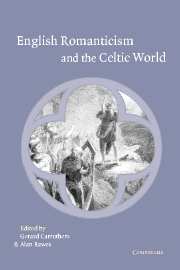Book contents
- Frontmatter
- Contents
- List of contributors
- Acknowledgements
- 1 Introduction: romancing the Celt
- 2 Sir William Jones, the Celtic Revival and the Oriental Renaissance
- 3 The critical response to Ossian's Romantic bequest
- 4 Blake and Gwendolen: territory, periphery and the proper name
- 5 The Welsh American dream: Iolo Morganwg, Robert Southey and the Madoc legend
- 6 Wordsworth, North Wales and the Celtic landscape
- 7 The force of ‘Celtic memories’ in Byron's thought
- 8 Shelley, Ireland and Romantic Orientalism
- 9 Byron and the ‘Ariosto of the North’
- 10 Scott and the British tourist
- 11 Felicia Hemans, Byronic cosmopolitanism and the ancient Welsh bards
- 12 Luttrell of Arran and the Romantic invention of Ireland
- 13 Contemporary Northern Irish poets and Romantic poetry
- Notes
- Bibliography
- Index
3 - The critical response to Ossian's Romantic bequest
Published online by Cambridge University Press: 22 September 2009
- Frontmatter
- Contents
- List of contributors
- Acknowledgements
- 1 Introduction: romancing the Celt
- 2 Sir William Jones, the Celtic Revival and the Oriental Renaissance
- 3 The critical response to Ossian's Romantic bequest
- 4 Blake and Gwendolen: territory, periphery and the proper name
- 5 The Welsh American dream: Iolo Morganwg, Robert Southey and the Madoc legend
- 6 Wordsworth, North Wales and the Celtic landscape
- 7 The force of ‘Celtic memories’ in Byron's thought
- 8 Shelley, Ireland and Romantic Orientalism
- 9 Byron and the ‘Ariosto of the North’
- 10 Scott and the British tourist
- 11 Felicia Hemans, Byronic cosmopolitanism and the ancient Welsh bards
- 12 Luttrell of Arran and the Romantic invention of Ireland
- 13 Contemporary Northern Irish poets and Romantic poetry
- Notes
- Bibliography
- Index
Summary
The Poems of Ossian were published between 1760 and 1763, to great acclaim and great controversy. The supposed remains of the third-century Gaelic warrior and poet Ossian, son of Fingal (or Fionn as he is more usually known in Gaelic), Ossian stands as a nexus between a variety of cultural and literary idioms and value systems. Of particular interest in the present context is the position of the poems as one of the first works of European Romanticism and as a major source for ideas of the Celtic within modern literary and wider cultural consciousness. This essay is particularly interested in the ways in which Ossian's influence upon the literary world has been portrayed within conventional scholarship. I am going to argue that for a variety of reasons, some sinister, some not, the true nature of Macpherson's importance has been obscured. I want to suggest that there is a tendency to marginalise Macpherson, even in the act of mentioning him, and indeed that such references frequently seem specifically designed to obscure, not reveal, Ossian's place in the Romantic pantheon.
A cursory consideration may lead to the conclusion that this is an unwarranted claim. After all, Samuel Monk, in his still classic examination of eighteenth-century ideas of the Sublime observes that ‘everyone who read, read Ossian, nothing could have been more on a level with the taste of the age’ while more recently as notable a Romantic scholar as Jerome MacGann has suggested that ‘Ossian's influence on the literary scene of the late eighteenth century eclipsed all others’.
- Type
- Chapter
- Information
- English Romanticism and the Celtic World , pp. 38 - 53Publisher: Cambridge University PressPrint publication year: 2003
- 1
- Cited by



